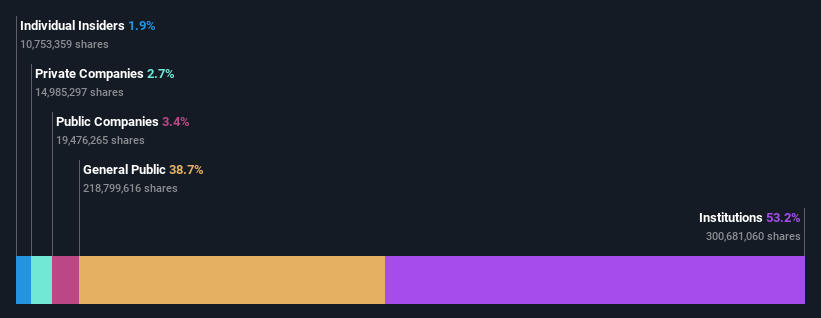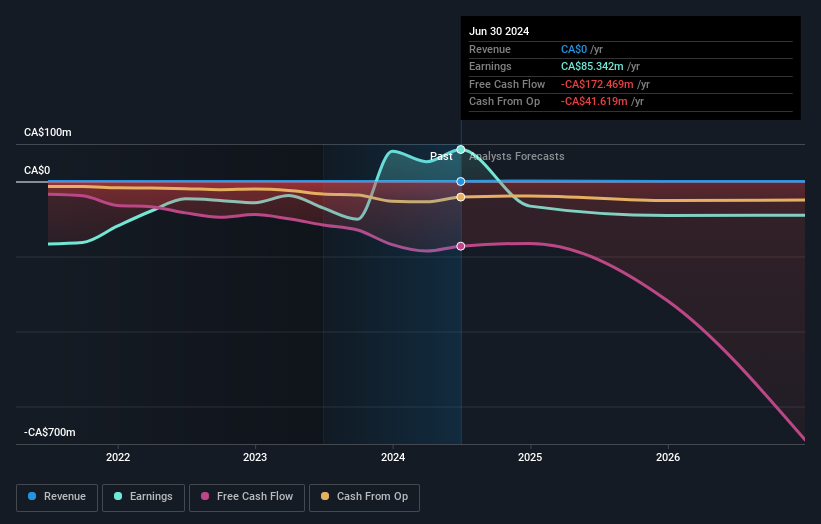- Canada
- /
- Oil and Gas
- /
- TSX:NXE
After losing 5.4% in the past year, NexGen Energy Ltd. (TSE:NXE) institutional owners must be relieved by the recent gain

Key Insights
- Given the large stake in the stock by institutions, NexGen Energy's stock price might be vulnerable to their trading decisions
- A total of 25 investors have a majority stake in the company with 42% ownership
- Insiders have sold recently
Every investor in NexGen Energy Ltd. (TSE:NXE) should be aware of the most powerful shareholder groups. With 53% stake, institutions possess the maximum shares in the company. That is, the group stands to benefit the most if the stock rises (or lose the most if there is a downturn).
Last week's CA$226m market cap gain would probably be appreciated by institutional investors, especially after a year of 5.4% losses.
Let's delve deeper into each type of owner of NexGen Energy, beginning with the chart below.
See our latest analysis for NexGen Energy

What Does The Institutional Ownership Tell Us About NexGen Energy?
Institutional investors commonly compare their own returns to the returns of a commonly followed index. So they generally do consider buying larger companies that are included in the relevant benchmark index.
As you can see, institutional investors have a fair amount of stake in NexGen Energy. This can indicate that the company has a certain degree of credibility in the investment community. However, it is best to be wary of relying on the supposed validation that comes with institutional investors. They too, get it wrong sometimes. It is not uncommon to see a big share price drop if two large institutional investors try to sell out of a stock at the same time. So it is worth checking the past earnings trajectory of NexGen Energy, (below). Of course, keep in mind that there are other factors to consider, too.

Investors should note that institutions actually own more than half the company, so they can collectively wield significant power. We note that hedge funds don't have a meaningful investment in NexGen Energy. L1 Capital Pty. Limited is currently the company's largest shareholder with 5.4% of shares outstanding. For context, the second largest shareholder holds about 5.1% of the shares outstanding, followed by an ownership of 3.4% by the third-largest shareholder. Additionally, the company's CEO Leigh Curyer directly holds 0.9% of the total shares outstanding.
A deeper look at our ownership data shows that the top 25 shareholders collectively hold less than half of the register, suggesting a large group of small holders where no single shareholder has a majority.
Researching institutional ownership is a good way to gauge and filter a stock's expected performance. The same can be achieved by studying analyst sentiments. There are plenty of analysts covering the stock, so it might be worth seeing what they are forecasting, too.
Insider Ownership Of NexGen Energy
While the precise definition of an insider can be subjective, almost everyone considers board members to be insiders. Company management run the business, but the CEO will answer to the board, even if he or she is a member of it.
I generally consider insider ownership to be a good thing. However, on some occasions it makes it more difficult for other shareholders to hold the board accountable for decisions.
We can report that insiders do own shares in NexGen Energy Ltd.. The insiders have a meaningful stake worth CA$84m. Most would see this as a real positive. If you would like to explore the question of insider alignment, you can click here to see if insiders have been buying or selling.
General Public Ownership
With a 39% ownership, the general public, mostly comprising of individual investors, have some degree of sway over NexGen Energy. This size of ownership, while considerable, may not be enough to change company policy if the decision is not in sync with other large shareholders.
Public Company Ownership
It appears to us that public companies own 3.4% of NexGen Energy. We can't be certain but it is quite possible this is a strategic stake. The businesses may be similar, or work together.
Next Steps:
I find it very interesting to look at who exactly owns a company. But to truly gain insight, we need to consider other information, too. For example, we've discovered 5 warning signs for NexGen Energy (3 make us uncomfortable!) that you should be aware of before investing here.
If you are like me, you may want to think about whether this company will grow or shrink. Luckily, you can check this free report showing analyst forecasts for its future.
NB: Figures in this article are calculated using data from the last twelve months, which refer to the 12-month period ending on the last date of the month the financial statement is dated. This may not be consistent with full year annual report figures.
Valuation is complex, but we're here to simplify it.
Discover if NexGen Energy might be undervalued or overvalued with our detailed analysis, featuring fair value estimates, potential risks, dividends, insider trades, and its financial condition.
Access Free AnalysisHave feedback on this article? Concerned about the content? Get in touch with us directly. Alternatively, email editorial-team (at) simplywallst.com.
This article by Simply Wall St is general in nature. We provide commentary based on historical data and analyst forecasts only using an unbiased methodology and our articles are not intended to be financial advice. It does not constitute a recommendation to buy or sell any stock, and does not take account of your objectives, or your financial situation. We aim to bring you long-term focused analysis driven by fundamental data. Note that our analysis may not factor in the latest price-sensitive company announcements or qualitative material. Simply Wall St has no position in any stocks mentioned.
About TSX:NXE
NexGen Energy
An exploration and development stage company, engages in the acquisition, exploration, and evaluation and development of uranium properties in Canada.
Adequate balance sheet slight.


